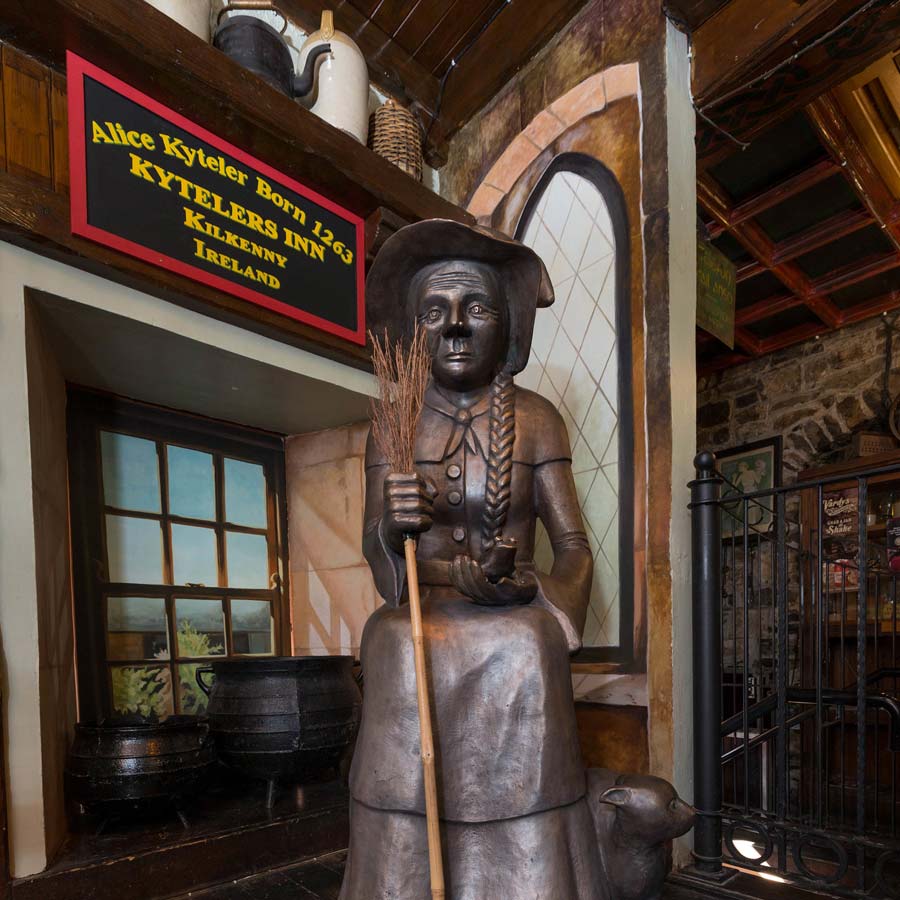
.
My first night in Ireland was spent in Kilkenny City. After a few drinks and a great bowl of seafood chowder, I booked a place on the ghost tour of the city. It was very fun, and our guide was very friendly and knowledgeable. One of the stops we made was to Kyteler's Inn, which had been owned by Alice Kyteler, the first woman to ever be accused of witchcraft in Ireland. I was already somewhat familiar with her story. I learned some additional details for our guide.
Alice was born in 1263. She was said to be very attractive and sophisticated. In 1280, she married her first husband -- In 1302, she married her second husband -- in 1309, her third -- and in 1324, her fourth. Each husband died from "illness," except her third one. He was said to have died during a "drunken spree." Each of Alice's husbands were very rich and very successful, and their fortunes went to Alice after they died.
Early on, people were already accusing Alice of witchcraft -- that was pretty common for independent and financially successful women back then. It was her fourth husband, who brought formal charges against her shortly before he died. Suddenly, witnesses came out of nowhere claiming to have seen Alice and her associates making sacrifices to the Devil and that her large black dog was actually a shapeshifting demon.
Unfortunately for her prosecutor, Richard Ledrede, the bishop of Ossory, Alice had some very influential friends. In fact, she even got Ledrede arrested. He was released by John Darcy, the Lord Chief Justice. However, by then, Alice had fled Ireland and disappeared into history. Sadly, one of her servants was made a scapegoat for her "crimes" and was flogged and burned at the stake.
Our guide shared a theory about the deaths of Alice Kyteler's husbands. Three out of four of them, the ones who took ill before they passed, displayed symptoms associated with arsenic poisoning -- emaciation, fingernails falling off, and hair turning gray and falling out.
Apparently, arsenic poisoning was not common in that era so medical experts were not able to give a proper diagnosis. Therefore, it was deemed to be the results of witchcraft. So instead of a witch, Alice may have been a "black widow," marrying rich men, killing them, and inheriting their wealth.
Aside from her story, Alice left behind her inn -- Kyteler's Inn. It was established in 1324. Originally, it was her home, but she expanded it into an inn, where she was said to entertain rich and influential men who showered her with expensive gifts.
I didn't get a chance to visit the inn, but it sounds like an awesome place. Customers are treated to old school charm and 21st Century amenities, live music, and amazing food and drinks. They can even join in comparative whiskey and gin tastings and learn how to make perfect Irish coffee.
Sigh. Maybe next time.
I left a link below for anyone who wants to learn more about Kyteler's Inn. Enjoy!




No comments:
Post a Comment